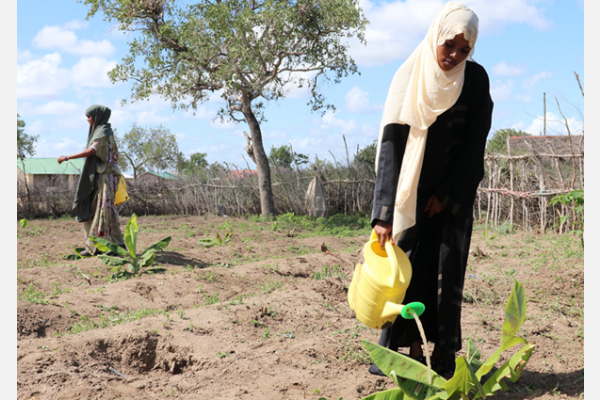Repository of Practices

Engaging Migrants and Diaspora Communities for an Inclusive and Climate-Resilient Blue Economy in Kenya
Dates
Type of practice
Geographic scope
Country:
Regions:
Sub Regions:
Local:
Summary
This project supported the Government of Kenya (GoK) in its efforts to strengthen community resilience to climate change by harnessing migrant and diaspora resources. The main interventions included GoK organizing policy dialogues with migrants and diaspora communities and convening a consortium of government institutions working in areas of migration and climate change. It also connected migrants and diaspora communities to training and resources that support low-carbon, resource-efficient paths to economic growth and development. The program trained migrants in Nairobi informal settlements, as well as farmers and fishers in Tana River County on waste management and Blue Economy activities, including ocean management, fish preservation, use of modern fishing equipment, and recycling, as well as agricultural best practices for coastal farming. The Migration, Environment and Climate Change (MECC) Technical Working Group (TWG) was developed, with representatives from relevant government ministries including the Ministry of Foreign Affairs, Ministry of Agriculture and Livestock, Diaspora Consortium of Kenya (DCK) and National Coordination Mechanism on Migration (NCM) to provide technical support for the successful implementation of the project.
The project built resilience of the migrant and diaspora communities while strengthening the government’s capacity to support climate-related activities by:
1. Improving information sharing and research on climate-resilience and Blue Economy interventions through dialogues with the government-led TWG.
2. Building skills and experience of coastal communities in Tana River County to implement solutions that mitigate the adverse impacts of climate change on the Blue Economy. This primarily targeted community members in fishing and agribusiness.
3. Connecting migrants in Nairobi City County to income-generating activities by providing resources and training on waste management and business skills.
4. Conducting a needs assessment and drafting training modules on the migration, environment, and climate change nexus for national and county government officials.
BENEFICIARIES:
1. National and county-level GOK representatives and local civil society organization (CSO) representatives
2. 20 Tawfiq Girls Champion Group members in Tana River County
3. 39 Kipini Beach Management Unit members responsible for coastal conservation
4. Nairobi Mathare Youth Group Conservation Group members
KEY ACTIVITIES:
1. Operationalized MECC TWG with government representatives to act as technical advisor throughout the project and conduct research to identify key gaps and strategic areas for engaging migrants and diaspora towards an inclusive and climate-resilient Blue Economies in Tana River and Nairobi County.
2. Donated five plastic recycling machines to a youth group in Nairobi’s Mathare informal settlement. The Mathare Youth Conservation Group was trained on how to use the machine to man
Organizations
Main Implementing Organization(s)
Detailed Information
Partner/Donor Organizations
Benefit and Impact
• Participants in Mathare waste management project used plastic recycling and moulding machines to generate goods they sold on the marketplace
• Follow-on interviews with beneficiaries in Tawfiq Girls Champion Group and Kipini BMUs indicated 90% of the beneficiaries noted that they gained immense knowledge on climate change during the September 2021 training and noted that the IOM donated fishing and farming gears will positively impact their lives and improve their livelihood.
Key Lessons
• Programmes focusing on migration, environment, and climate change nexus should continue to engage host governments on mainstreaming climate adaptation into national disaster risk management plans.
• The trainings on climate change and Blue Economy by IOM provided significant knowledge and relevance to the daily livelihoods of the two beneficiary groups. The IOM Migration, Environment, and Climate Change (MECC) Thematic trainings conducted at the national and county level to government officials were also essential and critical in the capacity building of government officials on the migration, environment, and climate change nexus.
Recommendations(if the practice is to be replicated)
• As migrants move, they play a vital role in advancing the sustainability and growth of local economies.
• Key to continue efforts on mainstreaming/including migration component on environment and climate change national and local development plans and policies.
• Training needs to be recurrent as staff changes within government structures.
• There is a need to train farmers and build their capacity on climate smart agriculture including plating drought-tolerant crops, irrigation and building green houses.
• Communication is key to ensure weather forecast information is effectively and timely transmitted to farmers, pastoralists and fishers.
Innovation
-Project enhanced knowledge and capacity building on Migration, Environment and Climate Change Nexus.
- Project empowered Pastoral Girls through training on Agribusiness and Climate Change Resilience and by providing them with farming inputs and equipment.
Additional Resources
Date submitted:
Disclaimer: The content of this practice reflects the views of the implementers and does not necessarily reflect the views of the United Nations, the United Nations Network on Migration, and its members.
More Related Practices:
- Strengthening the capacities and frameworks to collect data and evidence on migration, the environment and climate change (MECC) in Mexico
- IOM Engages Youth on Benefits of Migration at the 13th African Games in Accra, Ghana
- CLIMB Database
- Seguro Integral de Salud (SIS) – Protección financiera en Salud para peruanos y extranjeros residentes en el Perú
- Instituto Nacional Penitenciario | “Interno Universitario y Estudiando sin Fronteras”
Peer Reviewer Feedback:
*References to Kosovo shall be understood to be in the context of United Nations Security Council resolution 1244 (1999).
Newsletter
Subscribe to our newsletter.